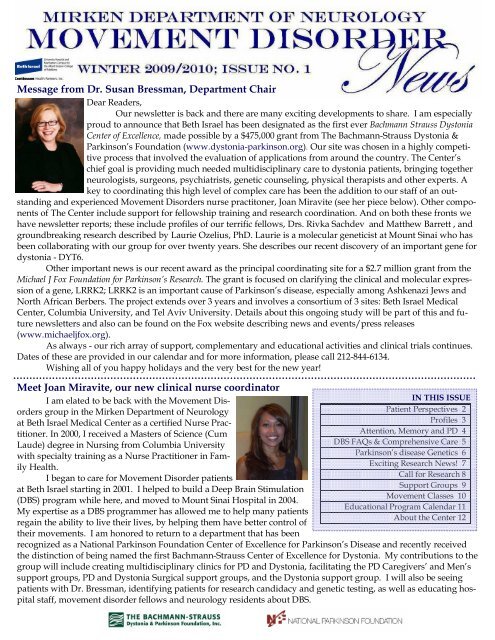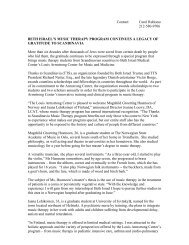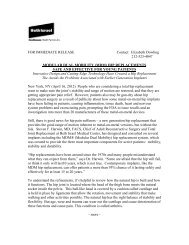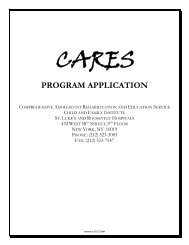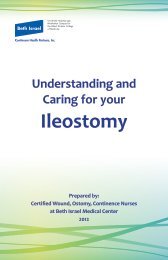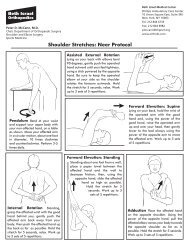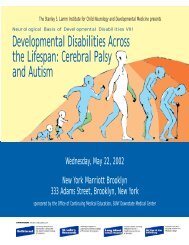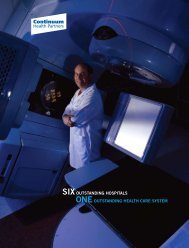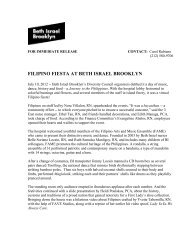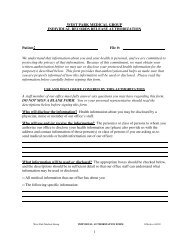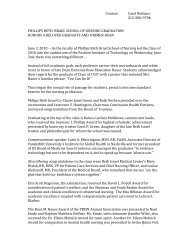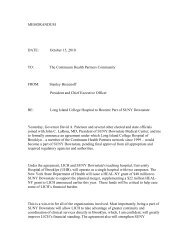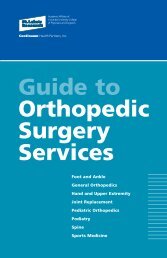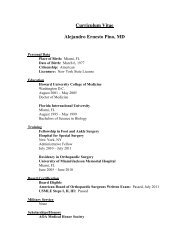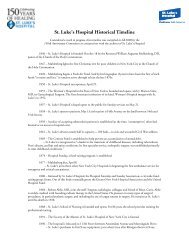Message from Dr. Susan Bressman, Department Chair Meet Joan ...
Message from Dr. Susan Bressman, Department Chair Meet Joan ...
Message from Dr. Susan Bressman, Department Chair Meet Joan ...
You also want an ePaper? Increase the reach of your titles
YUMPU automatically turns print PDFs into web optimized ePapers that Google loves.
<strong>Message</strong> <strong>from</strong> <strong>Dr</strong>. <strong>Susan</strong> <strong>Bressman</strong>, <strong>Department</strong> <strong>Chair</strong><br />
Dear Readers,<br />
Our newsletter is back and there are many exciting developments to share. I am especially<br />
proud to announce that Beth Israel has been designated as the first ever Bachmann Strauss Dystonia<br />
Center of Excellence, made possible by a $475,000 grant <strong>from</strong> The Bachmann-Strauss Dystonia &<br />
Parkinson’s Foundation (www.dystonia-parkinson.org). Our site was chosen in a highly competitive<br />
process that involved the evaluation of applications <strong>from</strong> around the country. The Center’s<br />
chief goal is providing much needed multidisciplinary care to dystonia patients, bringing together<br />
neurologists, surgeons, psychiatrists, genetic counseling, physical therapists and other experts. A<br />
key to coordinating this high level of complex care has been the addition to our staff of an outstanding<br />
and experienced Movement Disorders nurse practitoner, <strong>Joan</strong> Miravite (see her piece below). Other components<br />
of The Center include support for fellowship training and research coordination. And on both these fronts we<br />
have newsletter reports; these include profiles of our terrific fellows, <strong>Dr</strong>s. Rivka Sachdev and Matthew Barrett , and<br />
groundbreaking research described by Laurie Ozelius, PhD. Laurie is a molecular geneticist at Mount Sinai who has<br />
been collaborating with our group for over twenty years. She describes our recent discovery of an important gene for<br />
dystonia - DYT6.<br />
Other important news is our recent award as the principal coordinating site for a $2.7 million grant <strong>from</strong> the<br />
Michael J Fox Foundation for Parkinson’s Research. The grant is focused on clarifying the clinical and molecular expression<br />
of a gene, LRRK2; LRRK2 is an important cause of Parkinson’s disease, especially among Ashkenazi Jews and<br />
North African Berbers. The project extends over 3 years and involves a consortium of 3 sites: Beth Israel Medical<br />
Center, Columbia University, and Tel Aviv University. Details about this ongoing study will be part of this and future<br />
newsletters and also can be found on the Fox website describing news and events/press releases<br />
(www.michaeljfox.org).<br />
As always - our rich array of support, complementary and educational activities and clinical trials continues.<br />
Dates of these are provided in our calendar and for more information, please call 212-844-6134.<br />
Wishing all of you happy holidays and the very best for the new year!<br />
<strong>Meet</strong> <strong>Joan</strong> Miravite, our new clinical nurse coordinator<br />
I am elated to be back with the Movement Disorders<br />
group in the Mirken <strong>Department</strong> of Neurology<br />
at Beth Israel Medical Center as a certified Nurse Practitioner.<br />
In 2000, I received a Masters of Science (Cum<br />
Laude) degree in Nursing <strong>from</strong> Columbia University<br />
with specialty training as a Nurse Practitioner in Family<br />
Health.<br />
I began to care for Movement Disorder patients<br />
at Beth Israel starting in 2001. I helped to build a Deep Brain Stimulation<br />
(DBS) program while here, and moved to Mount Sinai Hospital in 2004.<br />
My expertise as a DBS programmer has allowed me to help many patients<br />
regain the ability to live their lives, by helping them have better control of<br />
their movements. I am honored to return to a department that has been<br />
IN THIS ISSUE<br />
Patient Perspectives 2<br />
Profiles 3<br />
Attention, Memory and PD 4<br />
DBS FAQs & Comprehensive Care 5<br />
Parkinson’s disease Genetics 6<br />
Exciting Research News! 7<br />
Call for Research 8<br />
Support Groups 9<br />
Movement Classes 10<br />
Educational Program Calendar 11<br />
About the Center 12<br />
recognized as a National Parkinson Foundation Center of Excellence for Parkinson’s Disease and recently received<br />
the distinction of being named the first Bachmann-Strauss Center of Excellence for Dystonia. My contributions to the<br />
group will include creating multidisciplinary clinics for PD and Dystonia, facilitating the PD Caregivers’ and Men’s<br />
support groups, PD and Dystonia Surgical support groups, and the Dystonia support group. I will also be seeing<br />
patients with <strong>Dr</strong>. <strong>Bressman</strong>, identifying patients for research candidacy and genetic testing, as well as educating hospital<br />
staff, movement disorder fellows and neurology residents about DBS.
page 2<br />
Beth Israel Parkinson’s disease and Movement Disorders Research Center<br />
Perspectives…<br />
Dystonia Patient Carrie Siu Butt running a half marathon in Chicago<br />
About 23 years ago I was diagnosed with dystonia. The disease started at puberty<br />
and as I got older, the disease got worse. As I approached my 30s, walking<br />
became a painful and arduous exercise and I feared a wheelchair was<br />
next. Three and a half years ago, I decided to have Deep Brain Stimulation<br />
(DBS) surgery to try and mitigate some of the physical pain of day to day life.<br />
Six weeks post brain surgery, the first miracle happened; I started walking<br />
"normally". I decided at that point that if I was well enough to run, I would<br />
set my sights on running a 10K; I did so one year post-surgery. For my third<br />
year anniversary I decided I would run my version of a marathon - 2 half<br />
marathons. On April 25th, I completed my first half marathon with tears of<br />
happiness. On August 2nd, I completed my second half marathon in Chicago.<br />
This race I dedicated to Suzie, my sister who is also battling with dystonia.<br />
This race was a little tricky since I blew out my IT band (iliotibial tract of the<br />
thigh) at mile 6, but I didn’t quit. I crossed the finish line with my friends and<br />
family cheering me on. Of course, now I want to complete a full marathon in<br />
one shot! I am currently signed up for the Disney World Marathon in January<br />
2010. Miracles can happen and every day I am thankful that the DBS surgery<br />
went well and I have a second chance at living! Miracles do happen when you believe!<br />
Photograph by Parkinson’s patient Jacob Mann<br />
“Summer Morning – Cloisters Museum” – Archival Inkjet Print<br />
I am a photographer based in Brooklyn, New<br />
York. I was born in the Ukraine, and have lived<br />
in the United States since 1989.<br />
Currently I'm working on Black and White Fine<br />
Art Photography projects. I've chosen black and<br />
white because it allows me to concentrate on<br />
building balanced and rhythmical compositions<br />
without distraction of color. A nice feature of<br />
black and white photography is that it leaves a<br />
lot to the imagination. Objects in black and<br />
white pictures look very different than in real<br />
life, making it easier to turn photographs into<br />
pieces of fine art. I consider my photography to<br />
be a study of the transformation of 3-dimensional space around us into the 2-dimensional space of flat<br />
photographs that creates new connections, juxtapositions, and new content. I find my subjects on the<br />
streets of New York. My goal is to show familiar objects in new light, creating images that emphasize harmony,<br />
rhythm and balance in geometry of lines and shapes.<br />
Mr. Mann’s current photography exhibit:<br />
October 2009 – January 2010<br />
Group exhibit at Brooklyn Historical Society<br />
Brooklyn, NY
Beth Israel Parkinson’s disease and Movement Disorders Research Center<br />
Profiles<br />
Our two newest Movement Disorders Fellows<br />
After graduating <strong>from</strong> Mount Sinai<br />
School of Medicine and completing an<br />
internship year in general internal<br />
medicine at SUNY Downstate Medical<br />
Center, I completed my neurology residency<br />
training at Tufts Medical Center<br />
in Boston. My interest in movement<br />
disorders developed during the latter<br />
part of residency when more of my<br />
time was spent in the outpatient setting. I decided to pursue<br />
this interest at the fellowship level and entered the<br />
program at the Center for Movement Disorders at Beth<br />
Israel Medical Center in July of 2008. I am honored to be<br />
the first Bachmann-Strauss Dystonia Center of Excellence<br />
dystonia fellow. With this distinction, I have begun working<br />
with <strong>Dr</strong>s. <strong>Susan</strong> <strong>Bressman</strong> and Rachel Saunders-<br />
Pullman on efforts to define the genetic etiologies of<br />
dystonia. My project focuses specifically on a gene for<br />
ataxia-telangiectasia and delineating the role this plays in<br />
the development of early onset and adolescent onset<br />
dystonia. I am grateful for the opportunity to develop as a<br />
movement disorders specialist at an institution that encourages<br />
both clinical and academic growth. My work<br />
caring for patients has been a rewarding learning experience<br />
as well and I look forward to completing my second<br />
year of fellowship.<br />
In early July I began my movement<br />
disorders fellowship at Beth Israel after<br />
completing my neurology residency at<br />
the University of Virginia. My interest<br />
in neurology began during my first<br />
year in medical school. This interest led<br />
to research in a lab focusing on neurodegenerative<br />
diseases. In the lab I<br />
investigated how mitochondrial dysfunction<br />
leads to neuronal cell death.<br />
Along with my interest in neurodegenerative diseases, during<br />
residency I found encounters with patients with movement<br />
disorders to be the most rewarding. There have been<br />
incredible advances in the field and treatment options<br />
have multiplied, but there is still plenty of work to be<br />
done. Having chosen to pursue a fellowship in movement<br />
disorders, I chose Beth Israel because I realized it would<br />
be an excellent place to develop my clinical skills and research<br />
interests. By better understanding what causes this<br />
group of diseases, I hope to contribute to advances in the<br />
field that can be applied to patient care. I am specifically<br />
interested in dystonia and Parkinson Disease (PD). At this<br />
time I will be investigating the association between<br />
Gaucher Disease mutations and PD. As the Bachmann-Strauss<br />
dystonia fellow next year, I look forward to<br />
developing a research project that investigates the dysfunctional<br />
neural networks that lead to dystonia.<br />
Research Staff<br />
Lauren Roth, Clinical Trials Manager and Anne Sebastian, Project Research Assistant<br />
I’ve worked at Beth Israel in the <strong>Department</strong><br />
of Neurology since May<br />
2008. Before joining the Movement Disorders<br />
Division this past July, I worked<br />
on clinical trials in Epilepsy. I have always<br />
been interested in medical research,<br />
so after receiving my B.S. in<br />
Biology <strong>from</strong> George Washington University,<br />
I started working on clinical<br />
trials. I spent a year as an Ophthalmic<br />
Technician, two years working on Oncology clinical trials<br />
at RadPharm, an Imaging Contract Research Organization,<br />
then two years working on clinical trials in Alzheimer’s,<br />
Depression, and Schizophrenia at Wyeth Research in<br />
Pennsylvania. This past May, 2009, I received my Master’s<br />
in Public Health <strong>from</strong> NYU in Community Public Health. I<br />
hope to eventually get my PhD in environmental health or<br />
epidemiology. I enjoy camping, hiking, reading, and going<br />
to the beach. I’m really happy to have the opportunity to<br />
join such wonderful people in the Movement Disorders<br />
Division here at Beth Israel!<br />
<strong>Dr</strong>s. Rivka Sachdev and Matthew Barrett<br />
I recently graduated <strong>from</strong> New York<br />
University with an honors degree in<br />
Economics and a concentration in Pre-<br />
Medicine. Prior to working at Beth<br />
Israel, I assisted in cardiology research<br />
at Mount Sinai, studying the role that<br />
pollution played on NYPD officers’<br />
health as part of the World Trade Center<br />
Project. In addition to my interest<br />
in medicine, I enjoy traveling, reading,<br />
and painting. As a research assistant, I<br />
am grateful for the opportunity to learn about movement<br />
disorders as well as to have an active role in conducting<br />
research. So far, my experience here has been very valuable<br />
and I hope to become a physician in the future.<br />
INTERESTED IN RESEARCH?<br />
page 3<br />
You can contact Lauren or Anne toll-free at<br />
(888) 228-1688
page 4<br />
Beth Israel Parkinson’s disease and Movement Disorders Research Center<br />
Attention, Memory and Parkinson’s disease<br />
It is very common for people,<br />
particularly as they get older,<br />
to notice changes in their attention<br />
and memory. Individuals<br />
with Parkinson’s disease also<br />
may notice slowness in the<br />
speed at which they think and<br />
complete their daily activities,<br />
such as paying bills and keeping track of conversations.<br />
A neuropsychologist helps determine if these<br />
cognitive changes are related to the normal aging<br />
process, Parkinson’s disease, or something<br />
else. Medications, for example, sometimes can<br />
cause mental dullness. Feeling sad, blue,<br />
stressed and anxious can contribute to inattention,<br />
forgetfulness, and slowness as well. Knowing<br />
the types and causes of cognitive difficulties<br />
can help your doctor better understand, diagnose<br />
and treat these symptoms.<br />
On one hand, there are medication options that<br />
can be considered for treatment of attention and<br />
memory problems. Addressing stress, worry,<br />
and sadness also can help enhance attention and<br />
memory; this can be approached with both<br />
medication and psychotherapy treatment approaches.<br />
Additionally, the doctor can recommend<br />
cognitive skills and strategies that a person<br />
can use to help compensate for weaknesses<br />
in their thinking. These strategies typically are<br />
reviewed during the follow-up appointment<br />
with the neuropsychologist, if a person has seen<br />
the doctor for a complete neuropsychological<br />
examination.<br />
NEW “COGNITIVE SKILLS” GROUP<br />
<strong>Dr</strong>. Palmese will be reviewing these strategies and<br />
other cognitive skills at the new monthly<br />
Question and Answer sessions:<br />
3 rd Mondays of the month, 5:30-6:30PM<br />
Dec. 21 st, Jan. 25 th, Feb. 22 nd, Mar. 22 nd, Apr. 19 th<br />
<strong>Meet</strong>ings will be held at<br />
Beth Israel; 10 Union Square East<br />
5 th Floor Levy Conference Room 5K04<br />
Christina Palmese, PhD<br />
HELPFUL STRATEGIES<br />
1. Use large digital clocks to keep track of the date<br />
and time.<br />
2. Use a notebook to keep track of appointments and<br />
other important information, such as “to do” lists.<br />
3. Create a large calendar (e.g., 2’ x 2’) for your wall or<br />
refrigerator. Write down all appointments and<br />
other important dates (e.g., medical appointments,<br />
birthdays) on the calendar.<br />
4. Timers can help you keep track of daily activities,<br />
such as cooking and laundry. Keeping the timer in<br />
the kitchen / near the oven can help you remember<br />
why the timer went off.<br />
5. Complete tasks in quiet environment that is free<br />
<strong>from</strong> distractions.<br />
6. Take frequent breaks during activities, and break<br />
down all tasks into small components.<br />
7. Complete one task at a time and reduce multitasking<br />
(i.e., doing multiple things at a time, including<br />
paying bills while listening to the television).<br />
8. Develop routines. For example, always put keys in<br />
the same place and take same route to the store.<br />
9. If you keep misplacing items, such as keys or<br />
glasses, purchase memory aids. For example, invest<br />
in a necklace/chain for glasses or beeper for<br />
keychain.<br />
10. Repeat information that needs to be remembered<br />
several times consecutively, as repetition enhances<br />
learning and memory. Also, try creating mnemonic<br />
devices (e.g., Ruth has red hair and rosy cheeks),<br />
remembering information within a specific context<br />
(e.g., visualizing when and where you completed<br />
certain activities), and using multi-sensory cues<br />
(e.g., remembering smells, sounds, colors, touch,<br />
and emotions associated with things to be remembered)<br />
to help strengthen learning.<br />
11. To assist with reading, you could consider using a<br />
“Kindle”. A Kindle is a computerized book that<br />
has features that allow you to increase font size and<br />
have the book, newspaper, or magazine read out<br />
loud to you (e.g., similar to books on tape).<br />
12. To remember where you keep things in your home,<br />
label cupboards, drawers, etc.<br />
13. Better Sleep Habits. This includes going to sleep<br />
and waking up at same time daily and getting a<br />
sufficient number of hours of sleep daily.
Beth Israel Parkinson’s disease and Movement Disorders Research Center<br />
Deep Brain Stimulation (DBS) Frequently Asked Questions<br />
<strong>Joan</strong> Miravite, FNP Clinical Nurse Coordinator<br />
WHAT IS DBS?<br />
DBS is a surgical therapy used to treat Parkinson’s disease<br />
(PD), Essential Tremor (ET), Dystonia, and Obsessive Compulsive<br />
Disorder (OCD). A neurosurgeon implants electrode<br />
(s) into specific areas within the brain then connects the electrode<br />
to a battery in the chest. Similar to the way a pacemaker<br />
works, the DBS battery is programmed to send electrical<br />
impulses to the brain to control disease symptoms. These<br />
electrical impulses allow the patients to have better control of<br />
their movements and regain function. Many patients describe<br />
this as “getting my life back”.<br />
WHO IS A CANDIDATE FOR DBS SURGERY?<br />
In PD, a good surgical candidate has advanced PD without<br />
dementia, responds to Levodopa or Sinemet, but suffers <strong>from</strong><br />
motor fluctuations in response to medications. Surgery for<br />
PD tremor that does not respond to medication typically results<br />
in reduction of tremor.<br />
Dystonia patients that respond well to DBS have primary or<br />
genetic dystonia, cervical or generalized symptoms, without<br />
damage to their brain (<strong>from</strong> trauma).<br />
ET patients are good candidates for surgery if they have severe,<br />
debilitating tremors that are not helped by medications.<br />
WHAT IS THE RECOVERY PERIOD? WHAT DO I EX-<br />
PECT AFTER SURGERY?<br />
Patients usually stay in the hospital overnight after the electrodes<br />
are implanted and are discharged home the next morning.<br />
One to two weeks later, they have the extension wire<br />
and batteries placed in an ambulatory surgery center, going<br />
home the same day. About one week later, the stimulation is<br />
turned on and adjusted. Since no two patients are alike, DBS<br />
adjustments are individualized. Settings are continually adjusted<br />
over time, depending on patient symptoms. It can take<br />
three to six months to reach the right setting and medication<br />
regimen in PD or ET. Dystonia symptoms respond more<br />
slowly to DBS, taking up to a year to see benefit.<br />
WILL I STILL NEED TO TAKE MY MEDICATIONS AF-<br />
TER DBS SURGERY?<br />
Yes, there is still a medication requirement. DBS may allow<br />
for reduction in medications <strong>from</strong> 20 to 60% for most PD patients.<br />
Medication decreases are also seen for ET and Dystonia<br />
patients after DBS surgery.<br />
HOW LONG DOES THE BATTERY LAST?<br />
Batteries last about 4-5 years, depending on the stimulation<br />
requirement for the patient. The new rechargeable batteries<br />
will last 9 years, but are not appropriate for all patients.<br />
IS DBS COVERED BY INSURANCE?<br />
Yes, since DBS therapy is FDA approved as a treatment for<br />
PD, ET, Dystonia and OCD, insurance companies cover the<br />
surgery and stimulation adjustments.<br />
IS DBS SUCCESSFUL?<br />
When an appropriate surgical candidate goes to a skilled neurosurgeon,<br />
has exact placement of DBS electrodes and quality<br />
stimulation programming, there is success with DBS therapy.<br />
NEW Deep Brain Stimulation (DBS)<br />
Surgical Support Group<br />
If you have questions, or would like to find out more<br />
information about Deep Brain Stimulation, please join<br />
us for our next meeting on<br />
Thursday, February 4 th, 1:00-3:00PM<br />
<strong>Meet</strong>ings are held at<br />
Beth Israel Medical Center; 10 Union Square East<br />
5 th Floor Levy Conference Room 5K04<br />
For info, call <strong>Joan</strong> Miravite, FNP 212.844.6134 or<br />
jmiravite@chpnet.org<br />
Beth Israel’s Comprehensive Care Clinics for PD and Dystonia<br />
page 5<br />
The <strong>Department</strong> of Neurology at Beth Israel Medical Center is a recognized leader in clinical expertise, genetics, research,<br />
and surgical treatment for patients with PD and dystonia. Our Division of Movement Disorders has the<br />
honor of being named a Parkinson’s disease (PD) Center of Excellence by the National Parkinson’s Foundation<br />
(NPF). As an NPF Center, we run a multidisciplinary clinic specifically for PD patients. The clinic allows patients to<br />
rotate between different practitioners and clinicians, including a neurologist, physical therapist, occupational therapist,<br />
social worker, psychiatrist, and a speech therapist during a single appointment .<br />
Our Movement Disorder Division was recently chosen as the first Bachmann-Strauss Dystonia & Parkinson’s Foundation<br />
Dystonia Center of Excellence. With this grant, the department plans to establish a multi-disciplinary comprehensive<br />
clinical care center for dystonia, with a dystonia clinic to be modeled after the NPF PD clinic. Both the<br />
Parkinson’s disease and dystonia clinics will be held on a monthly basis. We believe this comprehensive approach to<br />
the patient visit will allow us to better serve our patient population.
page 6<br />
Beth Israel Parkinson’s disease and Movement Disorders Research Center<br />
Is Parkinson’s<br />
Disease (PD)<br />
genetic?<br />
Genetic research<br />
around the world in<br />
recent years supports<br />
the idea that genes<br />
play a role in PD,<br />
dystonia, and many<br />
other diseases much more frequently<br />
than we once thought. The role of any<br />
particular gene in causing disease or<br />
maintaining health may be a leading one,<br />
like when one key player turns the tide<br />
of a football game, or a supporting one,<br />
like that of the other players on the team.<br />
Either way it takes the whole team to<br />
determine both victory and defeat. Similarly,<br />
our genes interact with other genes<br />
and with our environment in a very complex<br />
way. Understanding these multiple<br />
contributors to PD and their interactions<br />
will be key in the race for the cure.<br />
So far a handful of mostly rare genetic<br />
causes of PD have been identified. The<br />
one exception is a gene called LRRK2. A<br />
single change (or mutation) in this gene<br />
accounts for about 30% of familial and<br />
about 13% of non-familial PD in Ashkenazi<br />
Jews and up to 40% of all PD cases<br />
in North Africans. Those who have this<br />
genetic mutation may have about a 30%<br />
chance of developing PD in their lifetime,<br />
though this figure is still being debated<br />
and studied. The fact that most<br />
people who carry the mutation don’t<br />
ever have symptoms supports the idea<br />
that other unknown factors must also be<br />
present in order to cause symptoms.<br />
Should I have genetic testing to learn<br />
whether I carry a PD gene?<br />
The decision to have/not have testing is<br />
a personal one. Some people are compelled<br />
to have testing in order to solidify<br />
a diagnosis, to prevent exhaustive medical<br />
tests, to define risks to family members,<br />
to classify their symptoms in anticipation<br />
of future gene specific medications,<br />
or by a simple need to know.<br />
Other people choose not to have testing<br />
based on the current lack of a cure, the<br />
typically late onset of symptoms, and a<br />
desire not to burden relatives.<br />
Parkinson’s disease Genetics Q&A<br />
Deborah Raymond, CGC Genetic Counselor<br />
If you are considering genetic testing<br />
whether through a medical center or an<br />
on-line service such as “23andMe”, you<br />
should see a genetic counselor for an in<br />
depth discussion of the implications of<br />
this testing for you and your family.<br />
Will there be a cure for PD?<br />
We are very optimistic that scientists will<br />
eventually be able to intervene on a genetic<br />
or biochemical level to prevent or<br />
cure PD as well as other diseases. Making<br />
this happen is a big job, but researchers,<br />
including investigators at Beth Israel,<br />
are hard at work laying the groundwork<br />
for this effort by finding PD genes and<br />
learning as much as they can about how<br />
these genes work.<br />
Why is it important for me to participate<br />
in genetic research?<br />
Finding genes, even in the age of The<br />
Human Genome Project, is not easy.<br />
While the genetic code has been worked<br />
out, only a few thousand genes have<br />
been identified of the roughly 50,000 that<br />
each of us possess. So we still have a<br />
long way to go.<br />
The only way to find genes and prove<br />
that they cause disease is by having clinical<br />
information and blood samples <strong>from</strong><br />
many people who have the condition.<br />
Once this information is available, the<br />
researcher’s job is to identify patterns of<br />
genetic material that are more often present<br />
in affected individuals than in the<br />
general population. This leads to the<br />
isolation of a gene. Once a gene is found<br />
researchers still have to prove that<br />
changes in the gene cause symptoms.<br />
Then they can begin the job of learning<br />
what the new gene does, how it is expressed,<br />
and where one could intervene<br />
to fix what is wrong.<br />
The important thing to remember is that<br />
without your help, this research cannot go<br />
forward.<br />
How will I benefit <strong>from</strong> the research?<br />
Our hope is that a cure for PD will be<br />
found in our lifetime so that we, our children,<br />
grandchildren, and many generations<br />
to come may benefit <strong>from</strong> it.<br />
What genetic research is being done on<br />
PD at Beth Israel?<br />
We are very proud to be part of a new 3<br />
year consortium study, funded by the<br />
Michael J. Fox Foundation for Parkinson’s<br />
Research, together with Columbia<br />
University and Tel Aviv University. In<br />
this study we plan to enroll about 2000<br />
Ashkenazi Jewish PD patients <strong>from</strong> the 3<br />
sites and do in-depth studies of roughly<br />
800 patients and their close family members.<br />
Our purpose is to learn as much as<br />
possible about the clinical, genetic and<br />
environmental contributors to PD. We<br />
will also be looking at patient attitudes<br />
toward genetic testing for PD. Our hope<br />
is that we and others will be able to use<br />
what we learn to develop gene specific<br />
treatments, cures and prevention for PD.<br />
We will focus on LRRK2 as well as other<br />
PD genes.<br />
We are also involved in a long term<br />
study of the effects of hormones in PD,<br />
as well as a national PD sibling pair<br />
study (called Progeni) and a phase 3<br />
clinical trial for QE3 (Co-enzyme Q).<br />
I am worried about giving out my personal<br />
information and blood sample.<br />
The researchers at Beth Israel are completely<br />
committed to maintaining the<br />
confidentiality of our research participants.<br />
All of our studies are monitored<br />
by the Beth Israel Institutional Review<br />
Board, and the information we obtain<br />
about you is kept in locked files and entered<br />
into password protected and site<br />
limited or encrypted de-identified databases.<br />
As an added means of protection, we<br />
have obtained a Certificate of Confidentiality<br />
<strong>from</strong> The NIH for this study. This<br />
certificate would make it very difficult<br />
for anyone to obtain your information<br />
<strong>from</strong> us even under court subpoena.<br />
If you have questions regarding<br />
genetic counseling or testing, or if you<br />
are interested in participating in the research<br />
being done at Beth Israel,<br />
Please contact Ms. Raymond<br />
at 888-228-1688
Beth Israel Parkinson’s disease and Movement Disorders Research Center<br />
Exciting Research News!<br />
Center Awarded Michael J. Fox Foundation for Parkinson’s Research Grant to Study LRRK2 PD<br />
<strong>Dr</strong>. <strong>Susan</strong> <strong>Bressman</strong> and her colleagues at the Movement Disorders Research Center of the Mirken <strong>Department</strong> of Neurology at<br />
Beth Israel Medical Center, along with researchers at Columbia University and Tel Aviv University, have received a $2.7 million<br />
dollar grant <strong>from</strong> the Michael J. Fox Foundation for Parkinson's Research. The "Ashkenazi Jews, LRRK2 and Parkinson's Disease<br />
Project" will collect clinical, imaging and genetic information in order to further characterize the expression of Parkinson's disease<br />
(PD) caused by mutations in the gene LRRK2. Although genetic PD makes up a minority of PD cases overall, genetic research<br />
holds critical potential to help all people living with PD, whether or not they carry genetic mutations linked to the disease.<br />
By studying the biological processes underlying genetic forms of PD, like LRRK2 associated PD, scientists can elucidate<br />
mechanisms that play a role in the more common sporadic form of the disease, providing new avenues for therapeutic development.<br />
In 2006, <strong>Dr</strong>. <strong>Bressman</strong> and her colleagues at Albert Einstein College of Medicine reported that a specific mutation (G2019S) in the<br />
LRRK2 (leucine-rich repeat kinase 2) gene is a major cause of PD among Ashkenazi Jews. They found that LRRK2 caused PD in<br />
18% of their Ashkenazi Jewish PD patients regardless of family history, and was even more common (30%) among patients with<br />
a family history of PD. This finding, and work reported by a Tunisian group which found a high frequency (40%) of LRRK2 in<br />
North African Arab-Berbers, demonstrated that at least in certain populations genetic causes could be very important. The need<br />
for further collaborative research prompted the Fox Foundation to support a multi-institutional project focused on LRRK2, one<br />
of the most promising therapeutic targets for PD. In the clinical arm of this multi-institutional study, investigators will characterize<br />
the clinical features of the LRRK2 G2019S mutation, collect biomarker and imaging data, determine penetrance of diagnosed<br />
PD and examine attitudes toward genetic testing. The genetic arm will explore potential genetic modifiers of LRRK2 and<br />
also test for additional PD variants that increase risk of PD.<br />
Critical Research Questions addressed by this study:<br />
• How similar is LRRK2 PD to the more common sporadic form of the disease?<br />
• For individuals with LRRK2 mutations, what is the actual risk of developing PD?<br />
• Why do some individuals with LRRK2 mutations develop PD earlier in life, while others get the disease later or not at all?<br />
• What other factors (including genetic factors) play a role in the frequency and timing of PD in individuals with LRRK2 mutations?<br />
All told, about 2000 Ashkenazi Jewish patients with PD will be evaluated, and of this group about 150 families will be studied in<br />
detail (as well as control individuals without PD). The recruitment of patients and their family members is critical to the success<br />
of this study.<br />
For more information about the Ashkenazi Jews, LRRK2 and Parkinson's Disease Project, please call Beth Israel's <strong>Department</strong> of<br />
Neurology at 888-228-1688. For further information about the Michael J. Fox Foundation, please call 212-509-0995 or log on to<br />
www.michaeljfox.org<br />
page 7<br />
Dystonia Gene Discovery—THAP1 (DYT6) by Laurie Ozelius, PhD Molecular Geneticist<br />
A new major development in dystonia genetics is the identification by our team at Mount Sinai and at<br />
Beth Israel, of a new gene for the form of primary dystonia, DYT6. This gene, called THAP1, produces<br />
a transcription factor. A transcription factor is a type of protein that binds to other genes and turns<br />
them on and off. This gene mutation was first identified in a large Amish-Mennonite family with<br />
dystonia that had been involved in our original studies that localized the gene to chromosome 8. The<br />
people in this family developed symptoms at an average age of 16 yrs (range 5-38 years) and their<br />
symptoms typically involved the facial muscles often including difficulties with speech. However,<br />
some individuals in this family did have generalized dystonia similar to DYT1 dystonia.<br />
A second phase study explored whether other mutations in the THAP1 gene caused dystonia in families with similar<br />
clinical symptoms but with different ethnic backgrounds. In this study, we found that 25% of the families tested had mutations<br />
in the THAP1 gene. The clinical features in the families with mutations were very similar to the Amish-<br />
Mennonite family. These clinical features include dystonia of the arms (92%), cranial muscles (77%) and speech (67%)<br />
with the majority of individuals having generalized or segmental dystonia (10% had only a focal dystonia). Another<br />
study by our German collaborators identified mutations in this gene in two cases with generalized early onset dystonia<br />
including laryngeal involvement. More research studies are underway to determine what role THAP1 may have in focal<br />
dystonia and to determine what other genes are turned on or off by the THAP1 protein. The results of these additional<br />
research studies should provide further clues to the mechanisms underlying dystonia and provide possible therapeutic<br />
targets.
page 8<br />
Beth Israel Parkinson’s disease and Movement Disorders Research Center<br />
RESEARCH AT BETH ISRAEL – A CALL TO FAMILY AND FRIENDS…<br />
We are actively recruiting for several new and follow-up studies in Parkinson’s disease and dystonia.<br />
There is no cost to you to participate. In fact, all study visits and all study drugs are free.<br />
In most cases, we will reimburse your transportation costs to our center.<br />
CLINICAL DRUG TRIALS<br />
Effects of Coenzyme Q10 in Parkinson Disease<br />
A clinical trial open to people with newly diagnosed Parkinson’s disease, who are not yet taking any Parkinson’s medications. The<br />
purpose of this study is to find out whether CoQ can slow the progression of early PD. Participants may be assigned to receive<br />
1200mg of Coenzyme Q10 daily, 2400mg of Coenzyme Q10 daily, or a placebo (sugar pill). Study drug, multivitamins, and all visits<br />
and tests will be given at no cost to you while you are in the study. Principal Investigator, Lawrence Severt, MD, PhD<br />
Contact: Coordinator, Lauren Roth, MPH at (212) 844-6571<br />
GENETIC STUDIES<br />
What are the genes that contribute to Parkinson's disease and dystonia?<br />
Researchers at Beth Israel Medical Center are looking into this question so that we can develop better treatments and<br />
ultimately find the cures. Participation involves having a standard neurological exam, answering questionnaires and<br />
giving a blood sample. Ideally this will be done at Beth Israel but can be coordinated offsite as needed.<br />
If you are Jewish and have been diagnosed with Parkinson's disease, or<br />
If you have been diagnosed with dystonia and have at least one other family member with dystonia<br />
Please call Anne Sebastian or Deborah Raymond at 888-228-1688 or e-mail asebastian@chpnet.org for more info.<br />
RESEARCH STUDIES<br />
Biomarkers and Parkinson’s Disease<br />
Despite our increasing knowledge about the causes of Parkinson's disease, there is still little known about markers of disease progression,<br />
and factors which may be associated with slowed progression of PD. This study is recruiting men and women who have<br />
been diagnosed with Parkinson's within the past 7 years as well as unaffected family members or friends of patients. Participants<br />
will have a focused neurological examination, will draw spirals on a drawing tablet, and will have blood drawn. Principal Investigator,<br />
Rachel Saunders-Pullman, MD, MPH<br />
Contact: Coordinator, Kaili Stanley, BS, at (212) 844-6055<br />
PARS (Parkinson’s Associated Risk Syndrome)<br />
Do you ever wish that you could do more to help your family member with their struggle against Parkinson disease? The PARS<br />
study is groundbreaking study to test a strategy to evaluate individuals for early signs of Parkinson disease or other neurodegenerative<br />
disorders. The goal of the PARS study is to better understand who may be at risk for Parkinson disease so that it can ultimately<br />
be prevented before it starts. If you have a first degree relative (mother, father, sibling or child) diagnosed with Parkinson<br />
disease, you may be eligible to participate. Participants will be asked to complete a smell test and a brief questionnaire. Principal<br />
Investigator, Rachel Saunders-Pullman, MD, MPH<br />
Contact: Coordinator, Lauren Roth, MPH at (212) 844-6571<br />
Rutgers Memory Project<br />
In collaboration with the Memory Disorders Project at Rutgers-Newark (this group studies how the human brain stores memories),<br />
we are examining how memory is affected in patients with Parkinson's disease. Patients who are not yet on Parkinson's<br />
medications or are currently on levodopa are encouraged to participate.<br />
Contact: Coordinator, Lauren Roth, MPH at (212) 844-6571
Beth Israel Parkinson’s disease and Movement Disorders Research Center<br />
Support Groups<br />
Beth Israel Medical Center sponsors various support groups for individuals with Parkinson’s disease,<br />
Dystonia, Essential Tremor, and Ataxia. All support group meetings are held at<br />
Philips Ambulatory Care Center (PACC): 10 Union Square East, New York City, New York<br />
Parkinson’s Disease Support Groups<br />
We now offer 9 support groups for individuals with Parkinson’s as well as their caregivers:<br />
Beth Israel offers<br />
two monthly<br />
patient support groups,<br />
afternoon and evening<br />
sessions<br />
Patient Support Groups<br />
AFTERNOON: 2 nd Thursday of the month, 2-4pm<br />
WHERE: 5 th Floor Levy Conference Room 5K04<br />
EVENING: Last Thursday of the month, 6-8pm:<br />
WHERE: 2 nd Floor Conference Center, Rm 1<br />
CONTACT: Sheree Loftus, PhD: 212-844-8482<br />
MEN’S PARKINSON’S<br />
SUPPORT GROUP<br />
Please see tear-out<br />
calendar for all support<br />
group and movement class<br />
dates!<br />
WHEN: 1 st Monday of the month, 2-3:30pm<br />
WHERE: 5 th Floor Levy Conference Room 5K04<br />
CONTACT: <strong>Joan</strong> Miravite, FNP: 212-844-6134<br />
Caregiver Support Groups<br />
Beth Israel offers two monthly caregiver’s support<br />
groups, afternoon and evening sessions<br />
DAY: Select Thursday afternoons, 2-4pm<br />
WHERE: 5 th Floor Levy Conference Room 5K04<br />
EVENING: Select Wednesday evenings, 6-8pm:<br />
WHERE: 5 th Floor Conference Room 5E17<br />
CONTACT: <strong>Joan</strong> Miravite, FNP: 212-844-6134<br />
Open to all those diagnosed with PD<br />
before the age of 55<br />
WHEN: 2 nd Thursday of the month, 5:30-7:30pm<br />
WHERE: 5 th Floor Levy Conference Room 5K04<br />
CONTACT: Sheree Loftus, PhD: 212-844-8482<br />
Patients with PD, ET, or Dystonia who are interested in learning more about or have had DBS, are welcome<br />
to join us for our first DBS Surgical Support Group at Beth Israel. These groups are being facilitated by<br />
nurses <strong>from</strong> three different New York City institutions: Beth Israel, NYU/HJD and Columbia. <strong>Meet</strong>ing locations<br />
will rotate between these three centers. This will be an open forum for patients to learn about DBS and<br />
to discuss topics for future sessions.<br />
WHEN: Quarterly, 3 rd Thursday, 1-3pm: Next <strong>Meet</strong>ing: February 4, 2010<br />
WHERE: 5 th Floor Levy Conference Room 5K04<br />
Going on its 9 th year, the NYC Adult Dystonia Support<br />
Group is under the new leadership of <strong>Joan</strong><br />
Miravite, FNP. Please join us for lectures, open discussion,<br />
planning awareness activities and more!<br />
WHEN: Mondays, every six weeks; 6-8pm<br />
WHERE: 5 th Floor Levy Conference Room 5K04<br />
CONTACT: <strong>Joan</strong> Miravite, FNP: 212-844-6134<br />
YOUNG ONSET PARKINSON’S<br />
SUPPORT GROUP<br />
**NEW** Deep Brain Stimulation (DBS) Surgical Support Group<br />
NYC Adult Dystonia Support Group Tri-State Ataxia Support Group<br />
page 9<br />
This is a newly formed and diverse support group<br />
for individuals with all forms of ataxia. New members<br />
are welcome!<br />
CONTACT: Denise Mitchell markmeghan@aol.com<br />
WHEN: Quarterly Thursdays, 6-8pm<br />
WHERE: 5 th Floor Levy Conference Room 5K04
page 10<br />
Beth Israel Parkinson’s disease and Movement Disorders Research Center<br />
T’AI CHI CLASSES<br />
Instructor: Carolyn Perkins<br />
When: Thursdays 6:15 – 7:15 PM<br />
Where: 2 nd Floor Conference Room<br />
T’ai Chi is a simple, yet highly effective movement<br />
routine that brings up the body’s vital energy. No<br />
special clothing is required, and the complete form<br />
can be learned by taking only eight one-hour<br />
classes. Regular practice of the form may calm the<br />
nervous system, lower blood pressure, control<br />
weight gain, and improve concentration and balance.<br />
LATIN MOVEMENT DANCE CLASS<br />
Instructor: Jason Taniguchi<br />
When: Mondays 6:30 PM<br />
Where: 5 th Floor Levy Conference Room 5K04<br />
This dance and movement class is designed to improve<br />
motor control in Parkinson's disease.<br />
Additional benefits include aerobic exercise,<br />
social interaction, and just plain having fun!<br />
Class includes Merengue, Bachata & Salsa dances.<br />
Movement Classes<br />
CHAIR YOGA<br />
Instructor: Roberta Schine<br />
When: Tuesdays 3:30 – 4:30 PM<br />
Where: 2 nd Floor Conference Room<br />
Accept our invitation to join this gentle class designed<br />
to help people with Parkinson’s disease,<br />
dystonia, and other movement disorders. Emphasis<br />
is on flexibility, coordination, facial movement,<br />
voice, balance, and gait.<br />
“EASY DOES IT”<br />
FELDENKRAIS METHOD<br />
AWARENESS THROUGH MOVEMENT<br />
Instructor: Richard Sabel, OT<br />
When: recommencing Spring 2010<br />
Where: 5 th Floor Levy Conference Room 5K04<br />
Feldenkrais sessions help identify ways of moving<br />
that may be limiting function by allowing for new<br />
possibilities of movement and ease with daily activities.<br />
All lessons are done in a chair.<br />
No fee for any class or group. Donations are gratefully accepted.<br />
TO SIGN UP, PLEASE CONTACT: (212) 844-6134
Beth Israel Parkinson’s disease and Movement Disorders Research Center<br />
Educational Programs Calendar<br />
Caregiver’s Symposium — 2010<br />
March 5th, 2010; 10am—3pm<br />
Please join us for our 4 th Caregiver’s Symposium, sponsored by the Mirken <strong>Department</strong> of<br />
Neurology. Lectures, discussion, and lunch will be provided, followed by an offering of fun<br />
and energizing workshops including massage, yoga, relaxation techniques, Feldenkrais, and<br />
more!<br />
The symposium will be held in the 2nd Floor Friedman Conference Center<br />
Auditorium and Conference Rooms 1, 2, and 3<br />
Winter Lecture Series — 2010<br />
February 3rd and 17th, March 3rd and 24th, and April 7th and 28th<br />
Lectures begin at 6pm<br />
Please join us for our Winter Lecture Series, comprised of 6 educational sessions, <strong>from</strong><br />
February through April 2010. Topics will include genetics and research, movement therapies,<br />
Deep Brain Stimulation, medications, exercise, and alternative therapies for PD.<br />
Please watch for the Winter Lecture Series flyer for speakers and topics!<br />
Attention, Memory and Parkinson’s<br />
Disease<br />
Question and Answer<br />
Session<br />
<strong>Dr</strong>. Christina Palmese will lead a question<br />
and answer session to discuss changes in<br />
thinking that may occur with aging and in<br />
Parkinson’s disease<br />
Date and Time:<br />
3 rd Monday of the month, 5:30-6:30pm<br />
Dec. 21 st, Jan. 25 th, Feb. 22 nd, Mar. 22 nd, Apr. 19 th<br />
Levy Conference Room 5K04<br />
5 th Floor<br />
Beth Israel Sponsors<br />
International Essential Tremor Foundation<br />
(IETF) <strong>Meet</strong>ing<br />
<strong>Dr</strong>s. Lawrence Severt and Ron Alterman will<br />
speak about medical and surgical treatments<br />
for Essential Tremor<br />
Date and Time: Saturday, April 24, 2010;<br />
1:30-2:30PM<br />
page 11<br />
ALL PROGRAMS ARE HELD AT BETH ISRAEL MEDICAL CENTER; 10 UNION SQUARE EAST, NY, NY 10003<br />
Friedman Conference Center Auditorium;<br />
2 nd Floor
page 12<br />
Beth Israel Parkinson’s disease and Movement Disorders Research Center<br />
Parkinson’s disease and Movement<br />
Disorders Research Center Staff<br />
<strong>Susan</strong> <strong>Bressman</strong>, M.D.<br />
<strong>Chair</strong> of Neurology and Division Chief<br />
Rachel Saunders-Pullman, M.D., MPH<br />
Attending Neurologist<br />
Lawrence Severt, M.D.<br />
Attending Neurologist<br />
Vicki Shanker, M.D.<br />
Attending Neurologist<br />
Naomi Lubarr, M.D.<br />
Attending Neurologist/Pediatric Neurologist<br />
<strong>Joan</strong> Miravite, FNP<br />
Nurse Practitioner<br />
Mark Groves, M.D.<br />
Attending Psychiatrist<br />
Christina Palmese, PhD<br />
Neuro-psychologist<br />
Sheree Loftus Fader, PhD<br />
Nurse Scientist<br />
Deborah Raymond, M.S.<br />
Genetic Counselor<br />
Jeannie Soto-Valencia, B.A.<br />
Coordinator of Academic Affairs<br />
Kaili Stanley, B.S.<br />
Research Associate<br />
Lauren Roth, MPH<br />
Clinical Trials Manager<br />
Anne Sebastian, B.A.<br />
Project Research Assistant<br />
Editorial Staff<br />
<strong>Joan</strong> Miravite, FNP<br />
Editor in Chief<br />
Jeannie Soto-Valencia, B.A.<br />
Creative Editor<br />
About the Center<br />
CONTACT INFORMATION<br />
The Beth Israel Medical Center<br />
Movement Disorders Group<br />
10 Union Square East, Suite 5K;<br />
New York, NY 10003<br />
For an appointment:<br />
<strong>Dr</strong>. <strong>Bressman</strong>: (212) 844-8379<br />
<strong>Dr</strong>. Saunders-Pullman :(212) 844-8719<br />
<strong>Dr</strong>. Severt: (212) 844-6926<br />
<strong>Dr</strong>. Shanker: (212) 844-6902<br />
<strong>Dr</strong>. Lubarr: (212) 844-6162<br />
<strong>Dr</strong>. Groves: (212) 844-8483<br />
<strong>Dr</strong>. Palmese: (212) 844-8483<br />
<strong>Joan</strong> Miravite, FNP: (212) 844-6134<br />
Research Toll-Free: (888) 228-1688<br />
DONATIONS<br />
Philanthropic support of the Alan &<br />
Barbara Mirken <strong>Department</strong> of Neurology<br />
enables our staff to provide the best possible<br />
medical care, conduct pioneering clinical<br />
research, and train the next generation of<br />
world-class neurologists.<br />
Please contact Mara Rotbard,<br />
Finance Manager, at 212-844-8731 or<br />
mrotbard@chpnet.org for more<br />
information on specific programs<br />
and opportunities.<br />
If you are interested in submitting a<br />
photograph or story for our next newsletter,<br />
please contact:<br />
Jeannie Soto-Valencia at 212-844-8711 or<br />
jsoto@chpnet.org<br />
Not on our mailing list?<br />
Please call 212-844-6134 �


